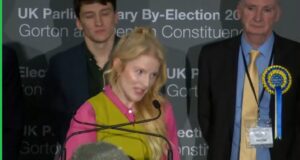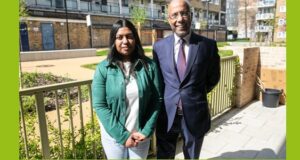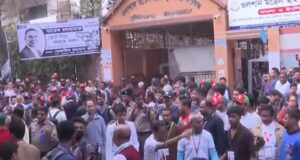
Left to right: Cllr Kabir Ahmed, Cllr Shafique Haque, Cllr Abdul Asad, Cllr Shahed Ali, Cllr Rofique Uddin Ahmed. Photo: Ashraf Ali Kha.
“We are not fighting the Labour Party;
we are fighting for justice.
If our Party has made a mistake
(by refusing to help the
Mayor’s Administration),
we have to fight to correct that mistake.”
Five Tower Hamlets councillors have been threatened with explusion from the Labour Party – and have hit back by asking whether the Labour Party is institutionally racist. The councillors are:
•Cllr Kabir Ahmed (Weavers)
•Cllr Shafique Haque (St Katharine’s & Wapping)
Cabinet Member, Jobs and Skills
•Cllr Abdul Asad (Whitechapel)
Cabinet Member, Health & Wellbeing
•Cllr Shahed Ali (Whitechapel)
Cabinet Member, Environment
•Cllr Rofique Uddin Ahmed (Mile End and Globe Town)
Cabinet Member, Regeneration
The five received letters from the national Labour Party dated 21st June alleging that they had broken rule 2.1.4.b, which prohibits campaigning for any candidate other than an official Labour Party candidate in an election. The letters gave them 14 days to respond to the allegations.
The letters, however, were full of gross inaccuracies. For example, one of the Councillors is accused of campaigning in support of “Ghulam Robbani in the GLA elections on 3rd May”. Cllr Robbani was not a candidate in GLA elections on 3rd May (though he was a candidate in a by-election on 19th April). It is therefore unlikely that any Labour Councillor was campaigning for him to win an election in which he was not standing.
The five have all responded to the letters from the Labour Party and await the Labour Party’s replies. They had not made the letters public, because they regarded this as an unresolved internal Labour Party matter. However, Labour Group Leader Cllr Joshua Peck has now issued a press release welcoming the expulsion of the five – as if the process had been concluded. The five therefore decided that they must put their case to the public at this point, and held a press conference on 10th July to explain their position.
Cllr Asad, opening the press conference, said that the Labour Party’s letters raised three questions:
•Is the Labour Party information accurate?
•Is the Labour Party open to legal challenge?
•Is the Labour Party racist?
Cllr Shahid Ali went on to explain why the five believe that the action being taken against them shows that the Labour Party is institutionally racist. “This is a clear case of institutional racism, based on race and religion,” he said. “Lord Sugar is a Labour Party peer. In the election of the London Mayor on 3rd May, he tweeted ‘I seriously suggest NO-ONE votes for Livingstone in the Mayoral elections.’ Ken Livingstone was the official Labour Party candidate. Dan Hodges wrote an article in the Daily Telegraph stating that he would be voting for Boris and against ‘Labour’s mayoral candidate’. Hodges is the son of former Labour MP Glenda Jackson and he used to work in Labour Party’s national office: he must know he was breaking the rules.”
Cllr Ali alleges that by treating five muslim Bangladeshi councillors from Tower Hamlets differently from how leading white establishment figures are treated, the Labour Party is institutionally racist. Institutional racism was developed as a term by the black community and by anti-racist campaigners in the 1980s to describe a situation in which an organisation, even though it is not openly racist against non-white individuals or groups, has practices which are racist, or racist in effect, within its internal systems. The term came into public use after the Stephen Lawrence inquiry, in which it was ruled that the Metropolitan police had been institutionally racist because they had not taken the murder of a black teenager on the London streets seriously.
Cllr Ali went on to say that Jim Fitzpatrick is notorious for having refused to attend a wedding as male and female guests were segregated. Cllr Ali was now alleging that Jim Fitzpatrick’s colleagues are practising segregation in the Labour Party: but Jim Fitzpatrick is reported in the local press as having referred to Cllr Ali’s allegations as “stupid nonsense”. Cllr Ali added that a report in the Daily Telegraph refers to the expulsions being on the grounds of the five councillors supporting Mayor Lutfur Rahman: this is not the reason given in the letters the five have received from the Labour Party.
Cllr Shafique Haque explained to the press conference that the five councillors distanced themselves from Labour – by taking Cabinet and Adviser positions – in the first place because of the actions of its local leaders, who had adopted a policy of not helping the Mayor’s Administration. “We are asking Labour to review what the local Labour Party is doing and whether it is in the best interests of the local community,” he said. “Let me put the question to Tower Hamlets Labour Party and Tower Hamlets Labour Group,” he continued: “they talk about us breaking the party Whip, but no disciplinary action has been taken against other prominent figures who have gone further.”
Cllr Rofique Ahmed said that his constituents had elected him in 2002, 2006 and 2010 to serve them and the whole community in the Borough. He explained that he would not speak at length, as he was considering his legal position, but stated, “I have not done anything wrong which would lead to me being expelled. I replied to the letter I received from the Labour Party, challenging the letter. The letter said I campaigned for Ghulam Robbani in the Spitalfields by-election. No one saw me do that. I asked the Labour Party what evidence they had.” Cllr Ahmed added that if his councillor colleagues had similarly been wrongly accused, he would fight with them for justice. Cllr Ahmed commented, “The Labour Party is affected by a virus: I have told Ed Miliband we need an anti-virus programme in the Borough to disinfect the Labour Party.”
Cllr Kabir Ahmed told the press conference: “We don’t want to be in politics for the sake of petty political games. We are in politics because we want to play a role in delivering services.” Cllr Ahmed explained that the Mayor had reinstated the EMA and started an energy co-op and the Mayor, like the five councillors, wanted to tackle crime and housing problems. Cllr Ahmed complained that the Labour Party seemed to put a higher value on sitting on the opposition benches and going out campaigning for the sake of it than on all councillors who had been elected on the Labour Party manifesto working together to deliver services.
Responding to questions, Cllr Haque pointed out that the five had been elected to serve the people, not to serve the Labour Party leader. He referred to Hartlepool, where six Labour councillors had, until very recently, served in the Cabinet of an independent mayor. He stressed that the five were asking the NEC to investigate why local politicians had set rules for Tower Hamlets which were different from the ones the Labour Party operated elsewhere in the country.
Cllr Kabir Ahmed pointed out that Mayor Rahman had been a Labour Party member who had been backed by a majority of Labour Party members – at which point the Labour Party had got rid of him. Mayor Rahman had then been elected by the voters, most of whom had been Labour supporters. The Labour Party appeared to have rejected the conclusion of the voters, as well as the views of their own members.
Cllr Ali was asked whether councillors such as themselves should perhaps have higher standards than Lord Sugar and Dan Hodges. Cllr Ali pointed out that the rules applied equally to all members.
Cllr Ali went on to say that the Labour Party is a national party, which had until recently been in government and the five councillors all hoped it would return to government as soon as possible. However, a party which aspires to govern should not make basic mistakes, such as those made in the letters to the councillors. The five councillors took their Labour Party membership very seriously and they would have expected the Labour Party to take their membership seriously too.
Cllr Asad confirmed that the five would wait for the Labour Party to reply to the letters the five had sent them and they would then consider their legal positions.
 East London News A Force for the community…
East London News A Force for the community…



